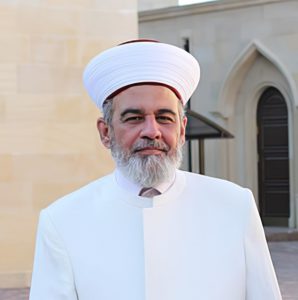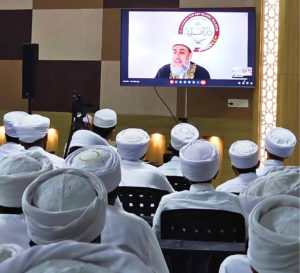(And) included in believing in the message of Prophet Muhammad is believing (that Muhammad, sallallahu ^alayhi wa sallam, is the last of the prophets). There is no prophet after him and no abrogator to the set of rules revealed to him. (And) believing that Prophet Muhammad is (the best of all the children of Adam) for he is the best of all of the creations of Allah and the highest among them in rank and status to Allah.
(Moreover, it is obligatory to believe every prophet of Allah must be attributed with truthfulness). It is impossible for them to lie because lying is an imperfection that contradicts the office of Prophethood. Prophets must be attributed with (trustworthiness). It is impossible for them to betray. They do not mislead people when they seek them for advice. Also, they do not unrightfully consume people’s money. (And) they must be attributed with (intelligence). All the Prophets are intelligent, and it is impossible for them to be attributed with stupidity or dullness, i.e., to have weak understanding. Stupidity is an attribute that contradicts their office, for Allah sent them to convey the message of Islam and to establish proofs against the stubborn blasphemers.
(Consequently, lying) and (dishonesty) are impossible to be among their attributes, as is (vileness), for these are the manners of individuals with low character. There is no prophet who sneaks lustful looks at marriageable women, and there is no one among them who steals—not even a single grape. No prophet is attributed with (foolishness), i.e., acting unwisely. Hence, none of the prophets utter phrases people find appalling and repelling. It is impossible for the prophets to be attributed with (dullness). No one of the Prophets is weak-minded, unable to establish the proofs against those who oppose him, or slow in understanding, needing to have statements repeated for him several times in order to understand. It is impossible for prophets to be attributed with (cowardice), However, it is not impossible for them to have the natural inherent fear[1]. It is impossible for prophets to commit a slip of the tongue—either in the religious matters or in the non-religious matters. (And every quality that repels people from accepting the call from them is impossible to be among their attributes) such as repelling ailments like worms coming out of their bodies.
(They must be attributed with impeccability), i.e., complete protection, without a single exception. (That is, they are protected from ever committing blasphemy, enormous sins (kaba’ir), and the small, abject) despicable (sins before and after Prophethood.) The Prophets are protected both before receiving the revelation of Prophethood and after from committing any blasphemy, major sin, or small sin which entails meanness and low character, like stealing a single grape. (On the other hand, they may commit other) non-despicable (small sins,) such as what occurred with our Master Adam. (However,) if they do commit such sins, (they are immediately guided to repent before others) of their nation (imitate them),because they are the example for their nations to follow.
(Hence, Prophethood was not bestowed upon the) ten (brothers of Yusuf, who, excluding Binyamin, committed the mean deeds mentioned in the Qur’an) of hitting Yusuf and throwing him in the well, and blaspheming by insulting their father, Prophet Ya^qub. Yusuf’s brother, Binyamin, was the only brother who did not participate in those mean deeds. (The Asbat) mentioned in the Qur’an are not the brothers who hurt Yusuf; rather, they (are the descendants of Yusuf’s brothers who were chosen for Prophethood.)
[1] Like the person repelling from a snake when surprised by it. Allah ta^ala said: ﴾ ﴿ which means: (Surat Taha/ 67).





